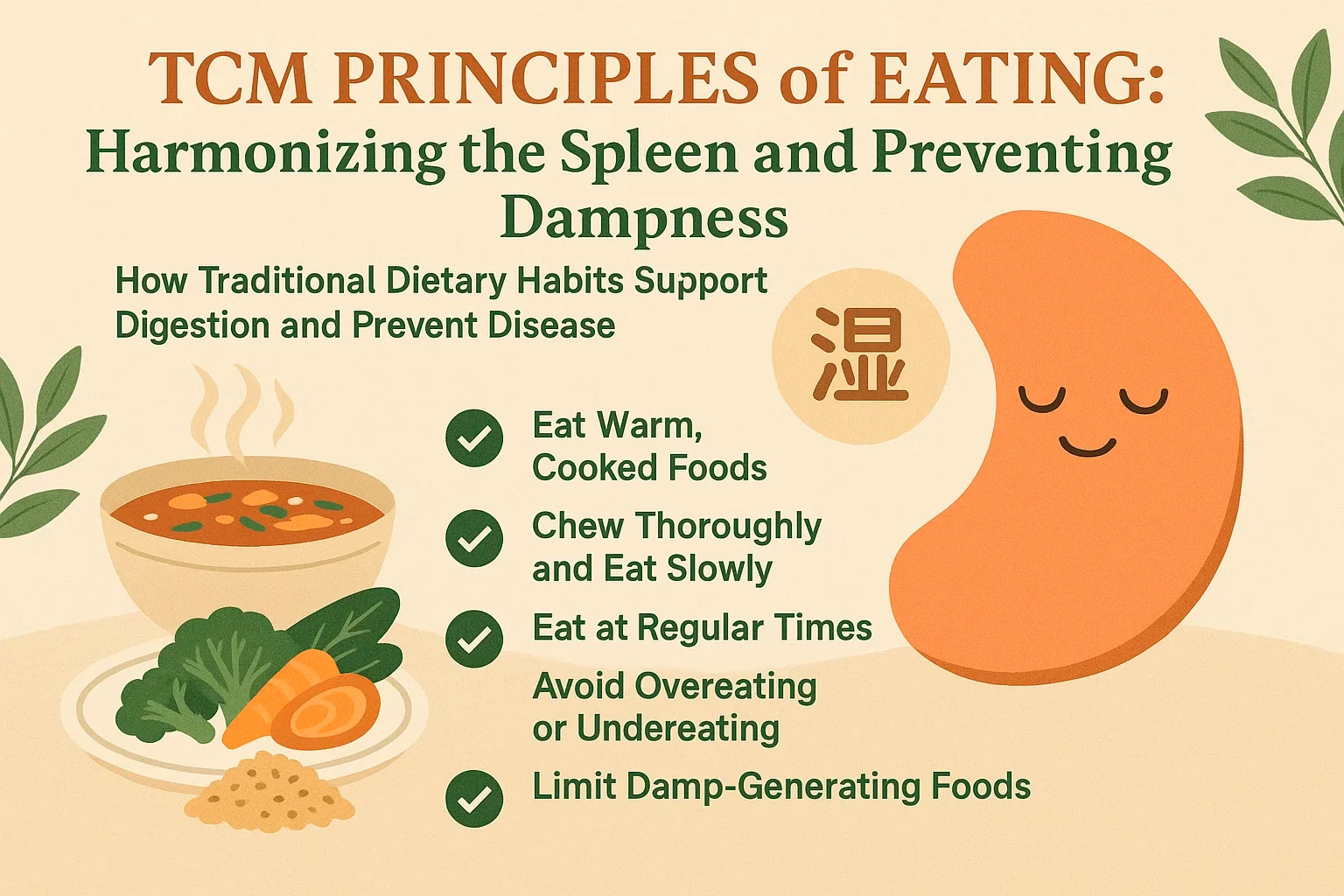How Traditional Dietary Habits Support Digestion and Prevent Disease
🔶 Introduction
In Traditional Chinese Medicine (TCM), eating is not just about nutrition or calories—it’s about supporting the body’s internal balance, particularly the Spleen and Stomach, which are considered the foundation of postnatal Qi (energy generated after birth).
One of the most common root causes of modern illness in TCM is Dampness, often related to poor dietary habits. Overeating, cold foods, eating at irregular times, and emotional eating all contribute to Spleen dysfunction and Damp accumulation, leading to symptoms like bloating, fatigue, brain fog, and even long-term issues such as phlegm disorders, digestive conditions, and weight gain.
This article explores how TCM guides daily eating through principles that harmonize digestion, protect Spleen Qi, and prevent the formation of Dampness.
🔶 The Spleen: Central to Digestion in TCM
In TCM, the Spleen and Stomach work together to transform food into Qi, Blood, and Fluids. The Stomach receives and ripens food, while the Spleen extracts the essence and transports it throughout the body.
When the Spleen is strong:
- Digestion is smooth.
- Energy is abundant.
- Fluids are properly distributed.
When the Spleen is weak:
- Food stagnates.
- Dampness accumulates.
- Qi is insufficient.
🔶 What Is Dampness?
Dampness (湿) is a pathological accumulation of fluids that disrupts normal physiological function. It may come from:
- External environment: humid weather or living conditions.
- Internal factors: poor digestion, cold/raw food, sugar, dairy, alcohol.
- Lifestyle habits: lack of movement, emotional stress, overwork.
Symptoms of Dampness include:
- Heaviness of body or limbs
- Sticky stools, loose bowels
- Mucus, phlegm, sinus congestion
- Swelling or edema
- Mental fog, sluggishness
🔶 Core TCM Eating Principles to Harmonize the Spleen
✅ 1. Eat Warm, Cooked Foods
The Spleen prefers warmth and is weakened by cold. Cold or raw foods require more energy to digest, burdening the Spleen.
- Favor: soups, porridges, steamed vegetables, stews
- Avoid: iced drinks, salads, smoothies (especially in cold seasons or weak digestion)
✅ 2. Chew Thoroughly and Eat Slowly
Digestion begins in the mouth. Eating too quickly creates stagnation and weakens Spleen Qi.
- Mindful eating aids digestion and enhances Qi absorption.
✅ 3. Eat at Regular Times
The Spleen has an optimal time of day (around 7–11 am) for food transformation. Skipping meals or erratic eating disrupts digestive Qi.
- Eat breakfast like a king, lunch moderately, and a lighter dinner.
✅ 4. Avoid Overeating or Undereating
Both extremes injure the Spleen:
- Overeating → stagnation, Dampness
- Undereating → Qi and Blood deficiency
Eat until 70–80% full for optimal digestion.
✅ 5. Limit Damp-Generating Foods
Some foods tend to generate internal Dampness:
- Cold/raw foods
- Greasy or fried foods
- Excessive dairy
- Sugar and sweets
- Alcohol
Instead, focus on foods that dry Dampness and strengthen the Spleen, like:
- Millet, barley, adzuki beans
- Ginger, scallions, garlic
- Pumpkin, carrots, shiitake mushrooms
🔶 Herbs and Teas for Spleen and Dampness
Gentle, food-grade herbs can be used as part of the diet to support digestion and prevent Dampness.
🌿 Helpful herbs include:
- Chen Pi (aged tangerine peel): Regulates Qi and dries Damp.
- Shan Zha (hawthorn berry): Aids digestion, especially for meats and greasy food.
- Fu Ling (poria mushroom): Drains Damp, strengthens Spleen.
- Bai Zhu (Atractylodes): Tonifies Spleen Qi, dries Dampness.
☕ Suggested teas:
- Ginger + red dates tea (for warming digestion)
- Roasted barley tea (reduces Dampness)
- Chen Pi + pu-erh tea (aids metabolism after heavy meals)
🔶 Emotional and Seasonal Eating
In TCM, emotions and seasons influence digestion:
- Worry and overthinking impair the Spleen.
- Autumn and late summer are Spleen-related seasons—ideal times to focus on gut health.
- In colder months, emphasize warming foods like stews, congees, and root vegetables.
🔶 Conclusion
Diet in TCM is both a therapeutic tool and a daily practice of balance. By following the principles of warmth, regularity, moderation, and Spleen-friendly foods, one can protect digestive Qi and prevent Dampness—the root of many chronic modern ailments.
Eating is not only nourishment for the body but also a way to harmonize with nature and one’s inner rhythms. In TCM, a well-fed Spleen is the foundation of strong Qi and vibrant health.


发表回复